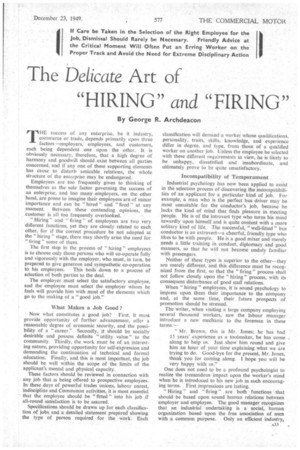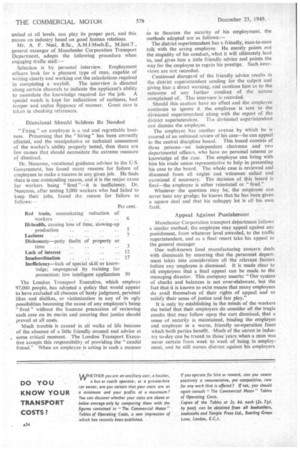The Delicate Art of "HIRING" and "FIRING" By George R.
Page 51

Page 52

If you've noticed an error in this article please click here to report it so we can fix it.
Archdeacon THE success of any enterprise, be it industry, commerce or trade, depends primarily upon three factors--employers, employees, and customers, each being dependent one upon the other. It is obviously necessary, therefore, that a high degree of harmony and goodwill should. exist between all parties concerned, and if any one of these supporting elements has cause to disturb amicable relations, the whole structure of the enterprise may be endangered.
Employees are too frequently given to thinking of themselves as the sole factor governing the success of an enterprise, and too many employers, on the other hand, are prone to imagine their employees-are of minor importance and can be " hired " and " fired " at any moment. Between these contending opinions, the customer is all too frequently overlooked.
Hiring" and " firing " of employees are two very different functions, yet they are closely related to each other, for if the correct procedure be not adopted at the " hiring " stage, there may shortly arise the need for " firing " some of them.
The first step in the process of " hiring" employees is to choose only those persons who will co-operate fully and vigorously with the employer, who must, in turn, be prepared to give generous and sympathetic co-operation to his employees. This boils down to a process of selection of both parties to the deal.
The employer must select the satisfactory employee, and the employee must select the employer whom he feels will provide him with most of the elements which go to the making of a "good job."
What Makes a Job Good ?
Now what constitutes a good job? First, it must provide opportunity of further advancement, offer a reasonable degree of economic security, and the possibility of a "career." Secondly, it should be socially desirable and possess definite "utility value" to the community. Thirdly, the work must be of an interesting nature, providing opportunity for self-expression and demanding the continuation of technical and formal education. Finally, and this is most important, the job should be well within the scope of the limits of the applicant's mental and physical capacity.
These factors should be reviewed in connection with any job that is being offered to prospective employees. In these days of powerful trades unions, labour unrest, indiscipline and Communist activities, it is most essential that the employee should be " fitted " into his job if all-round satisfaction is to be assured.
Specifications should be drawn up for each classification of jobs and a detailed statement prepared' showing the type of person required for the work. Each classification will demand a worker whose qualifications, personality, traits, skills, knowledge, and experience differ in degree, and type, from those of a qualified worker on another job. Unless the emplOyee be selected with these different requirements in view, he is likely to be unhappy, dissatisfied and insubordinate, and ultimately prove to be quite unsatisfactory.
Incompatibility of Temperament
Industrial psychology has now been applied to assist in the selection process of discovering the incompatibilities of an applicant for a particular kind of job. For example, a man who is the perfect bus driver may be most unsuitable for the conductor's job, because he lacks the kind of mind that finds pleasure in meeting people. I-le is of the introvert type who turns his mind inwardly upon himself and is quite content with a more solitary kind of life. The successful, well-fitted " bus conductor is an extrovert—a cheerful, friendly type who likes to be with people. He is a good mixer and merely needs a little training in conduct, diplomacy and good manners, so that he will not become unduly familiar with passengers.
Neither of these types is superior to the other—they are merely different, and this difference must be recognized from the first, so that the " firing " process shall not follow closely upon the "hiring" process, with its consequent disturbance of good staff relations.
When " hiring " employees, it is sound psychology to impress upon them their importance to the company and, at the same time, their future prospects of promotion should be stressed.
The writer, when visiting a large company employing several thousand workers, saw the labour manager introduce a new mechanic to the foreman in these terms:
" Mr. Brown, this is Mr. Jones; he has had 15 years' experience as a toolmaker, he has come along to help us. Just show him round and give him an hour of your time explaining what we are trying to do. Good-bye for the present, Mr. Jones, thank you for coming along. I hope you will be very happy with us."
One does not peed to be a profound psychologist to realize the tremendous impact upon the worker's mind when he is introduced to his new job in such encouraging terms. First impressions are lasting.
" Hiring " and " firing " are both functions that should be based upon sound human relations between employer and employee. The good manager recognizes that an industrial undertaking is a social, human organization based upon the free association of men with a common purpose. Only an efficient industry,
united at all levels, can play its proper part, and this means an industry based on good human relations.
Mr. A. F. Neal, B.Sc., A.M.I.Mech.E., M.Inst.T., general manager of Manchester Corporation Transport Department, adopts the following procedure when engaging traffic stall:—
Selection is by personal interview. Employment officers look for a pleasant type of man, capable of writing clearly and working out the calculations required in completing a waybill. The interview is directed along certain channels to indicate the applicant's ability to assimilate the knowledge required for the job. A special watch is kept for indications of surliness, bad temper and undue flippancy of manner. Great care is taken in checking references.
Dismissal Should Seldom Be Needed " Firing " an employee is a sad and regrettable business. Presuming that the " hiring " has been correctly effected, and the manipulative or technical assessment of the worker's ability properly tested, then there are few causes that should necessitate the extreme measure of dismissal.
Dr. Norcross, vocational guidance advisor to the U.S. Government, has found many reasons for failure of employees to make a success in any given job. He finds there is one outstanding reason, and it is the major cause for workers being "fired "—it is inefficiency. Dr. Norcross, after testing 5,000 workers who had failed to keep their jobs, found the reason for failure as follows: — Bad trade, necessitating reduction of workers . . 6 Ill-health, causing loss of time, slowing-up production 5 Laziness .. 7 Dishonesty—petty thefts of property or time .. 3 Lack of interest 12 Insubordination .. 17 Inefficiency—lack of special skill or know ledge; unprepared by training for promotion; low intelligent application 50 The London Transport Executive, which employs 97,000 people, has adopted a policy that would appear to have excluded all chances of hasty judgment, personal likes and dislikes, or victimization in any of its ugly possibilities becoming the cause of any employee's being " fired " without the humane precaution of reviewing each case on its merits and assuring that justice should prevail at all costs.
Much trouble is caused in all walks of life because of the absence of a little friendly counsel and advice at „ some critical moment. The London Transport Executive accepts this responsibility of providing the "candid friend." When an employee is acting in such a manner
as to .threaten the security of his employment, the methods adopted are as follows:— The district superintendent has a friendly, man-to-man talk with the erring employee. He merely points out the stupidity of his conduct,i what it will ultimately, lead to, and gives him a little friendly advice and points the way for the employee to regain his prestige. Such interviews are not recorded.
Continued disregard •of the friendly advice results in the district superintendent sending for the culprit and giving him a direct warning, and cautions him as to the outcome of any further conduct of the nature complained of. This interview is recorded. Should this caution have no effect and the employee continues to ignore it, the. employee is sent to the divisional superintendent along with the report of the district superintendent. The divisional superintendent can dismiss the employee. The employee has another avenue by which he is assured of an unbiased review of his case—he can appeal to the central discipline board. This board consists of three persons—an independent chairman and two departmental officers, who have no personal interest or knowledge of the case. The employee can bring with him his trade union representative to help in presenting his case to the board. The whole case is reviewed arid discussed from all angles and witnesses called and examined if necessary. The decision of this board is final—the employee is either reinstated or "fired." Whatever the question may be, the employee can never bear any grudge; he knows that he has been given a square deal and that his unhappy lot is all his own fa ult.
Appeal Against Punishment Manchester Corporation transport department follows a similar method; the employee may appeal against any punishment, from whatever level awarded, to the traffic superintendent, and as a final resort take his appeal to the general manager.
One well-known food manufacturing concern deals with dismissals by ensuring that the personnel depart ment takes into consideration all the relevant factors before any employee is dismissed. It is made clear to all employees that a final appeal can be made to the managing director. This company asserts: "Our system of checks and balances is not over-elaborate, but the fact that it is known to exist means that many employees do avail themselves of their rights of appeal and so satisfy their sense of justice and fair play."
It is only by establishing in the minds of the workers the belief that their employers do consider all the tragic results that may follow upon the curt dismissal, that a sense of security is maintained, binding the employee and employer in a warm, friendly co-operation from which both parties benefit. Much of the unrest in industry to-day can be traced to those years when a man was • never certain from week to week of being in employment, and he still nurses distrust against his employers.




















































































